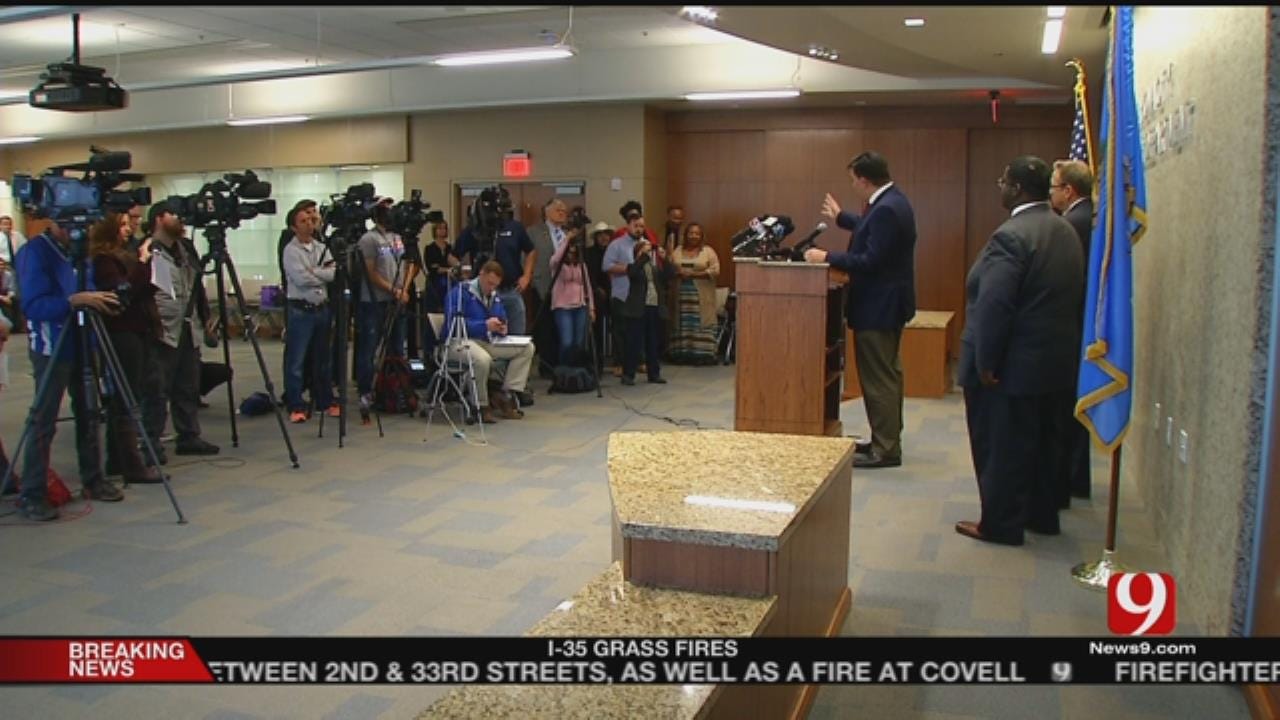OCPD, FOP Agree On Use Of Body Cameras
<p>After months of negotiations, Oklahoma City police and the Oklahoma City chapter of the Fraternal Order of Police announce the return of body cameras to the Oklahoma City Police force.</p>Tuesday, November 29th 2016, 7:20 pm
After months of negotiations, Oklahoma City police and the Oklahoma City chapter of the Fraternal Order of Police announce the return of body cameras to the Oklahoma City Police force.
As a result of the new 11 page agreement, patrol officers at all of the patrol stations across the city should be fully trained and outfitted with those body cameras at the first of the year.
For about 13 months both the FOP, OCPD and arbitrators have been working on coming to terms on the policies and procedures that needed to be in place for the body cam program to be approved by both sides.
Back in June an arbitrator ruled in favor of the FOP to halt the program until details could be agreed upon -which was midway through the department's body cam pilot program.
After months of meetings with both the FOP, city leaders, community leaders and community groups like the NAACP and ACLU - those procedures have finally been worked out on 3 major points. Namely, when the officers need to turn the cameras on, audits to hold officers accountable, and policies for managers and supervisors reviewing the video evidence to make sure officers are following set policies and procedures.
"Because we have to be able to hold the officers accountable for not turning the cameras on," said Oklahoma City Police Chief Bill Citty. "That's a huge issue across the country."
During the pilot program, there were 100 cameras to be shared among 2nd shift patrol officers. But now, thanks to a $270,000 federal grant, Oklahoma City police will be adding 180 cameras - to be shared among patrol officers on all shifts.
"I believe this agreement between the city of Oklahoma City and the FOP is one of the best agreements that this country has ever seen," said Ward 7 Oklahoma City City Councilman John A. Pettit Jr.
Tuesday morning's announcement culminated months of talks between city leaders, the FOP and community activists.
"I just want to thank the citizens and civic groups that were very patient during this whole time," said FOP President John George. "I know it was stressful, everyone wanting to see it done. All I can say now is it's done and we'll get cameras back on the street as quick as we can."
Under terms of the new agreement officers must activate the body worn cameras by the time they arrive on a call, but they do not have to wear one when interviewing victims or witnesses or during other private or sensitive situations protected by law. After completing body worn camera training, each officer has a 90 day grace period for unintentionally failing to activate the camera when its required. Chief Citty confirms consistently failing to activate the camera during the grace period would potentially result in an administrative investigation and corrective action.
Police say the initial one year cost of the program is about $405,000 that includes the first 100 cameras, supporting equipment, and payroll costs for 4 new employees to manage the system. The $270,000 grant will add the 180 extra cameras to complete the program. Police state the cameras will be distributed as evenly as possible across patrol divisions and shifts.
Community leaders involved in molding the new policies and procedures say the body cam program creates an added layer of transparency and proof which protects both officers and the public.
"The cameras are important for us - it protects us from them, but it protects them from us," said Garland Pruitt, the Oklahoma City NAACP President. "It covers both and that's a good thing!"
"Again this is a great day for Oklahoma City," said Grace Franklin with Oklahoma City Artists for Justice. "We don't think body cams will change everything, but it does give us an additional tool to get justice for all and to have compassion on both sides and accountability on both sides."
There has also been a new group formed the past couple of years called Police And Community Trust (PACT), which has become instrumental in bringing police chiefs, civil rights leaders, disability and law experts, and community activists together to build trust and relationships with police officers and the citizens and communities they are entrusted to patrol and protect.
"This is a great day for civil liberties, " said Brady Henderson, spokesperson with the ACLU. " It is a great day because it's a start."
More Like This
November 29th, 2016
March 22nd, 2024
March 14th, 2024
February 9th, 2024
Top Headlines
April 25th, 2024
April 25th, 2024











